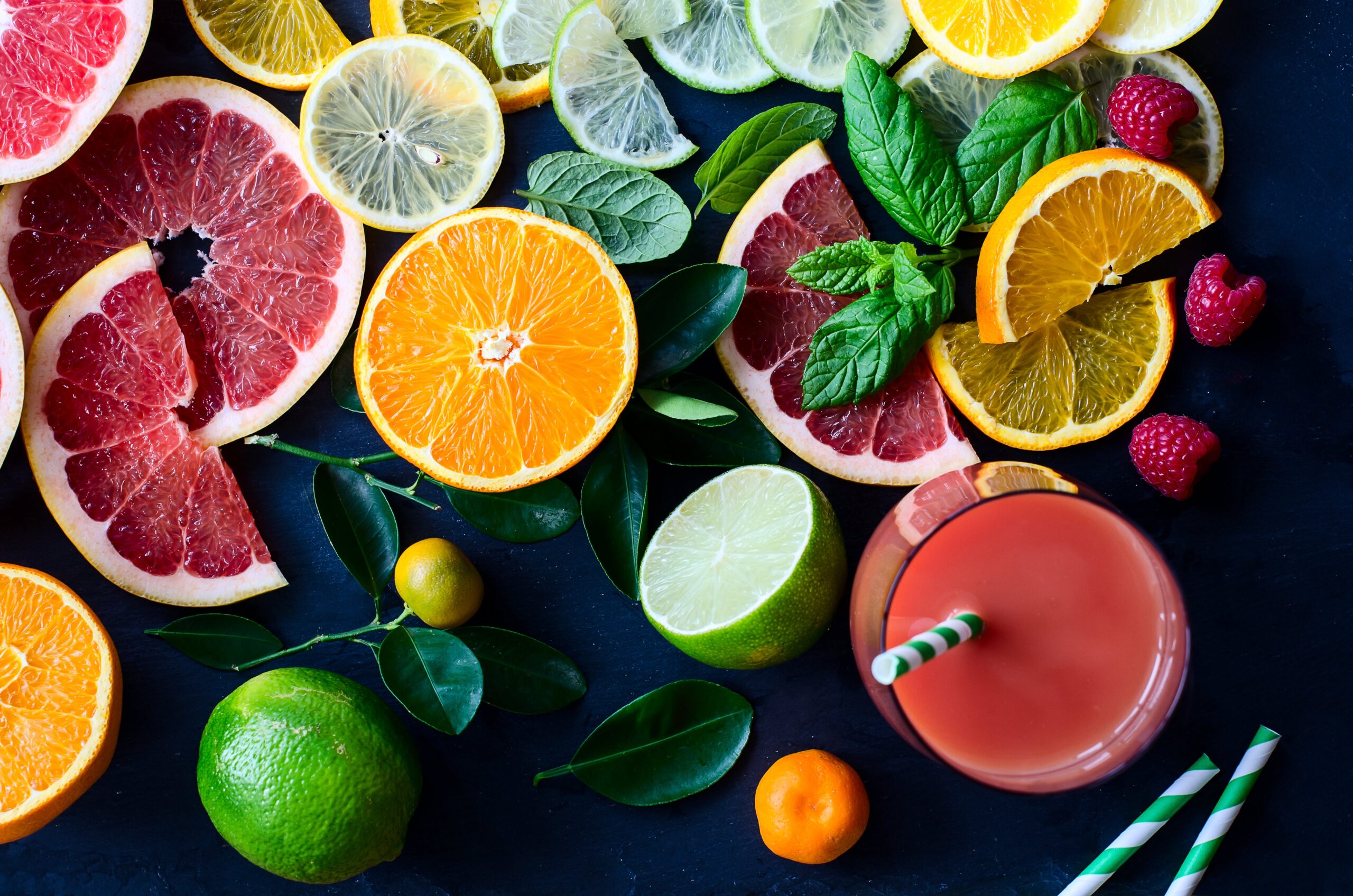Do you get enough vitamin C and do you know why it’s an important vitamin? Vitamin C, or ascorbic acid, is an essential nutrient that our bodies need to stay healthy. The main benefits are that it helps to protect the cells, and that it maintains the health of the skin, bones, cartilage and blood vessels.
It’s pretty easy to get your daily dose of vitamin C because it’s found in lots of different fruits and vegetables. But if you think you’re not getting enough, read on for a list of foods that are high in vitamin C, and for some simple tips on switching up your diet.
Which foods are high in vitamin C?
Fruit and veg are the main places you can find high levels of vitamin C. With such a wide range (as you can see below) you’re sure to find something you and your family enjoy eating.
Citrus fruits
- Oranges and orange juice
- Grapefruits
- Lemons
- Limes
Berries
- Blackcurrants
- Strawberries
- Raspberries
- Blueberries
- Cranberries
Tropical fruits
- Papaya
- Guava
- Pineapple
- Kiwi fruit
- Mango
- Lychees
- Honeydew melon
- Cantaloupe melon
- Watermelon
Vegetables
- Spinach
- Bell peppers
- Peas
- Chili peppers
- Tomatoes
- Cauliflower
- Cabbage
- Broccoli
- Brussels sprouts
- Potatoes
How much vitamin C do I need each day?
The NHS advises that teenagers and adults (aged 19-64) need 40 milligrams (mg) of vitamin C each day. That equates to roughly the following:
- 20g of blackcurrants
- 150ml glass of orange juice
- 1/3 of a 100g red pepper
Children also need a bit of vitamin C each day – around 30 milligrams up to the age of 10, and 35 milligrams up to the age of 15.
What’s the best way to eat vitamin C-rich foods?
Eating your fruit and veg raw is the best thing to do when you’re trying to increase your vitamin C intake. This is because heating your food during the cooking process reduces the content of ascorbic acid by about one third.
Obviously, not all vitamin C-rich foods should be eaten raw (e.g. potatoes) and you’ll probably find that you prefer some types cooked, making them easier to incorporate into your daily diet. It’s best to get a balance and find what works for you.
Are canned foods high in vitamin C?
As with cooking, the canning process involves applying heat, and this can break down the vitamin C content in your fruit and veg. It’s fine to have canned fruit and veg in your diet, but try to get some of the fresh stuff too. Frozen is also a good option, especially if you’re on a budget, as the freezing process helps preserve the vitamin content.
Another thing to remember with canned fruits and vegetables is that they often come with added sugar and salt. When you’re shopping, look out for products that come in natural juice or water, with no added sugar or salt. The traffic light nutrition system can help you easily spot which fruits and vegetables have added sugar and salt.
How can I get more vitamin C-rich foods in my diet?
There some easy ways to get vitamin C-rich foods into your diet:
- Make tasty smoothies packed with fresh and frozen fruit like berries and mango
- Have fruit salad and yoghurt for a nutritious and healthy dessert
- Jazz up a plain salad with bell peppers and tomatoes
- Snack on raw veg dipped in hummus or guacamole
- Bulk out soups and stews with green veg and potatoes
If you’re looking for easy recipes for inspiration, the NHS site Change 4 Life is a great place to start as the meals here are tailor-made to be healthy and balanced. Some great vitamin C-rich recipe ideas include:
- Raspberry, orange and apple refresher
- Cheats’ pizza calzone with bell peppers and tomatoes
- Mean ‘n’ green mac ‘n’ cheese with broccoli, spinach and peas
- Tropical fruits with banana dip
Should I take vitamin C supplements?
You should be able to get all the vitamin C you need from the foods you eat, but if you do want to take vitamin C supplements make sure you don’t have more than 1,000 milligrams (mg) each day. If you do have more than this you might get an upset tummy and experience cramps and diarrhoea.
When choosing supplements it’s best to check which age they’re suitable for, especially children’s vitamins so you can be sure they’re getting the right amount.
##product-carousel:nutri-within-vitamin-c-1000mg-365-tablets,lloydspharmacy-vitamin-c-500mg-90-tablets,lloydspharmacy-vitamin-c-200mg-30-tablets,healthspan-love-your-immunity-supplements,high-strength-effervescent-vitamin-c-1000mg-20-effervescent-tablets,healthspan-vitamin-c-citrus-gummies-30s,healthaid-vitamin-c-500mg-60-vegetarian-tablets,healthspan-immunovit-super-c-vegan-d-plus-tablets-x-60,natures-bounty-vitamin-c-zinc-sugar-free-gummies,active-iron-immune-30-capsules,vitawell-immunity-duo-chewable-vitamin-c-d,vost-vitamin-c-1000mg-effervescent-tablets-10s,solgar®-vitamin-c-500-mg-vegetable-capsules,natures-bounty-vitamin-c-1000-mg-with-rose-hips-caplets,cnp-vitamin-c-500mg-90-tablets##
What happens if I don’t get enough vitamin C?
If you don’t get enough vitamin C you’ll be at risk of developing scurvy, which is perhaps best known as a historical condition that affected sailors who became malnourished while at sea. Today, scurvy is rare, but it can happen to people who have a diet low in fruits and vegetables.
Symptoms of scurvy include:
- Feeling tired and weak
- Muscle and joint pain
- Bruising easily
- Small bruise-like spots on your skin
If you think you might have a vitamin C deficiency, it’s a good idea to see your GP. You might simply need to eat more vitamin C-rich foods. However, you might have an underlying condition that’s affecting your body’s ability to absorb nutrients. People with Crohn’s disease and ulcerative colitis are more at risk of scurvy, as are smokers.
References
www.nhs.uk/conditions/vitamins-and-minerals/vitamin-c
https://patient.info/healthy-living/vitamin-c-deficiency-leaflet
www.netdoctor.co.uk/healthy-eating/a23331916/vitamin-c-the-8-best-foods-to-get-your-daily-fix
www.bbc.com/future/article/20200427-frozen-fresh-or-canned-food-whats-more-nutritious
www.nhs.uk/live-well/eat-well/5-a-day-what-counts

Leave a Reply